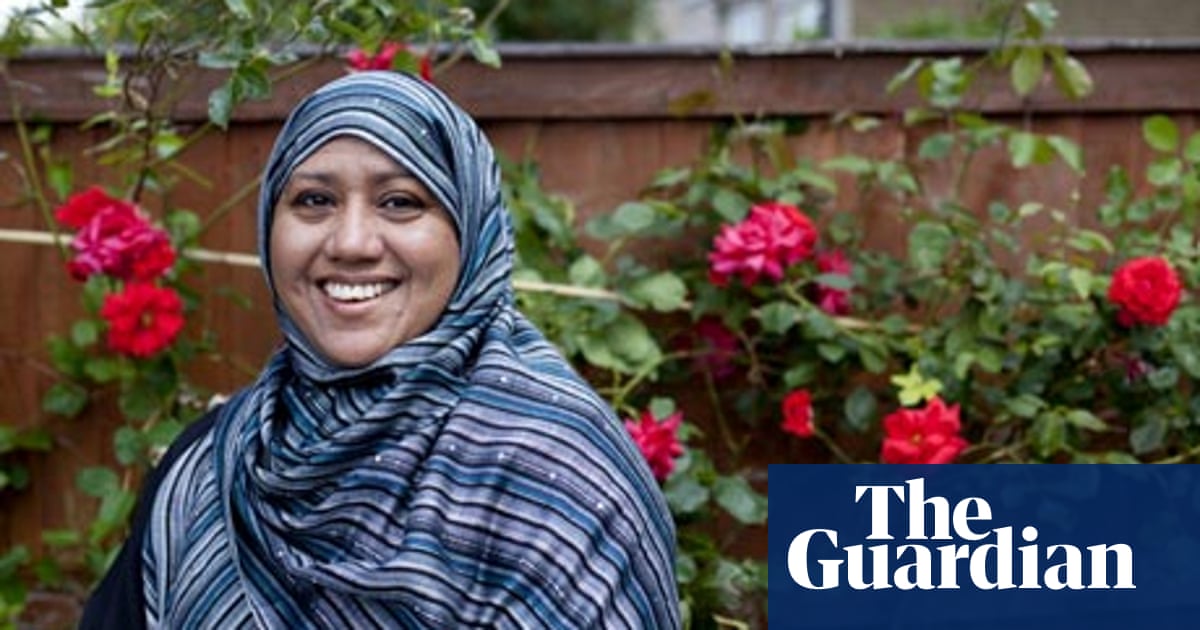Wapping Womens Centre

Eco Community Garden
Sufia Alam is the Manager of Wapping Women’s Centre, established in 1981 and based in East London. The organisation aims to empower women by providing a safe and supportive environment, and giving women access to educational, social and recreational programmes and activities.
I was brought up in Yorkshire; then I married a Londoner and moved down here. I was shocked: there were few green spaces in the area and everything was so dirty. London is undoubtedly congested, but I found the Muslim community accepted the mess. Islam teaches us to look after our environment, which includes our neighbourhood, yet I found nobody took responsibility for their actions and insisted the mess was someone else’s and the council would clean it up! I have been manager here at the centre for
11 years, and work on our Community Garden Project. The idea for the garden project came when the Chair of the Wapping Women’s Centre, Aysha Mahmood, was going into retirement after over a decade of youth work and wanted to leave something behind for the local women to remember her by.
It has blossomed into an inspirational scheme, which allows women on a housing estate to grow organic vegetables that originate from their homeland of Bangladesh. The gardens are based at the Berner Estate, in between three blocks on flats. Prior to the project, the land was a dumping ground for local residents and attracted a lot of vermin.
After consultation with the local residents we designed garden plots that would cater for the needs of local people who used to grow vegetables in planters on their balconies. The council helped set up this platform to engage with Muslim women, and the local housing office was very supportive of our garden proposal, for it meant they would save money in maintenance costs.
Over the last 10 years the project has given the local women who are predominantly from the Bangladeshi community a focal point. A group of 50 women signed up, aged between 25 and 65. It was wonderful that the women were so eager to grow their own vegetables and herbs. The project has opened up opportunities for women to make their own compost and train the young gardeners, and allowed for them to socialise outside of their homes.
We have recently been allocated some land for people with disabilities and young children to have access to growing. Tower Hamlets is a much cleaner and jollier place to live in now, and the council has invested so much to make it so. The project also includes a composting site for the local residents. I feel passionate about working together to combat litter and spread the message of recycling. I want to urge people to take responsibility and remember that we are all accountable in the eyes of God. As Muslims we must try to be an example to others.







Update & Links

Essential English
Cuts to beginners' language courses will hit the most vulnerable people hard, say campaigners
When her husband died suddenly 12 years ago, Minara was left to bring up her nine children in a deprived part of east London, speaking very little English.
English language classes at Wapping women’s centre became the 35-year-old’s lifeline. Her husband had always dealt with the family paperwork; now she had to, but was unable to read or understand it.
She left her youngest children in the centre’s creche and joined a beginner’s course in English for speakers of other languages (Esol).
Minara is now at level 3 – the standard required to sit the British citizenship test – and has started her own catering business.
She is one of 28 mainly Bangladeshi women on Esol courses at the centre; 20 more are on its waiting list. “Esol courses are essential to these women’s survival,” says Sufia Alam, the centre’s manager. “Without the classes, they wouldn’t be able to speak to emergency services, fill out benefit forms, or go to the doctor without help.
“Some are so buoyed by knowing basic English, they go to their local libraries, think about attending the local college or working in their communities and take a bus ride out of town,” she says.
No longer, it seems.
Wapping women’s centre is a community outreach site of Tower Hamlets College. According to a document circulated to college staff and seen by Education Guardian, entitled Securing the Future, the centre is one of 11 that the college proposes to “withdraw provision” from in 2009-10.
The result would be a saving of £45,000 excluding pay costs, the college says.
Job losses
On top of this, staff say, the college has told them that nine people’s jobs are at risk of compulsory redundancy – the equivalent of just over seven full-time Esol teaching posts.
It’s not just in Tower Hamlets that Esol budgets are being slashed, but across the country. The Manchester College, one of the UK’s biggest, with 80,000 students, says “as part of a continuous review process, the college has identified the need to reduce staffing in Esol and is engaged in a process with the staff and trade unions concerned”. It won’t talk about the numbers of student places or staff to be cut.
At Hackney Community College in north-east London, a basic Esol course – entry 1 level literacy – is no longer going to be offered on its own. It will be taught with a vocational course such as childcare. The college says this will help students progress into employment.
Hackney Community College says: “We are adjusting our provision in this way to try to meet the demands of both our communities and our funders, to help us to keep a breadth of provision and ultimately help more learners to enrol on college courses and succeed.”
But the most basic needs – and rights some would say – of vulnerable communities are not being met, say students and Esol teachers.
John Biggs, London assembly member for City and East, is so worried about the situation that he is urging the London mayor, Boris Johnson, to look into the matter urgently. “The impact of these proposed cutbacks on east London would be catastrophic. As well as the jobs lost, the provision of Esol courses would fall by half – a devastating loss for an area as diverse as Tower Hamlets and a massive setback for community integration.”
At Solihull College in the West Midlands, a trade union officer says Esol courses are threatened and course fees have risen. The college would not make a comment.
Just why colleges are having to make these cuts – or threaten to make them – is unclear. The colleges receive their funding from the Learning and Skills Council (LSC), which in turn receives its funding from the Department for Business, Innovation and Skills (BIS).
A spokeswoman from BIS says that far from cutting Esol funds, the government has trebled its investment in the courses since 2000-01. It gave £300m last year and the Department for Work and Pensions and the Department for Communities and Local Government added to this. But this is only half the story. In the last three years, Esol funds have stayed the same, despite demand for them increasing.
Colleges say the government wants Esol classes to only go to higher-level learners who go on longer courses and that this has resulted in a reduction of funds for beginner-level courses, which the most vulnerable people, such as Minara need. The government denies this and says its priority is still people like Minara. “We want to focus provision on those most in need, the most vulnerable and the hardest to reach,” a government spokeswoman says. “That is why we are asking local authorities to identify priority groups and work with the LSC and colleges to make this happen. The bulk of ESOL provision is for those with the most basic ESOL needs, ie, at entry level. We see no reason for this to change.”
Colleges have been asked to look more carefully at just who the priority learners are, says Chris Taylor, programme director for Esol at the National Institute of Adult Continuing Education. “Vulnerable women don’t always push their way to the front of the queue,” he says.
Tower Hamlets’ principal, Michael Farley, says that since 2005-06, 1,998 student places funded by the LSC have been cut at his college and an extra 1,000 are to go in the next academic year. Many of these are from Esol or basic skills – Skills For Life – courses, he says. An estimated 2,000 are left.
“The college’s policy of delivering courses against which no income is received is simply not sustainable as it is putting untenable strains on the college’s finances,” he says.
“We have been directed to ensure our provision provides long courses as a priority. Therefore we are forced to redirect our funding into courses which are, by their very nature, more expensive than short courses. With the same amount of money we can provide fewer long courses than short courses, and this reduces student numbers.
“The governors are saddened that they have had to make this decision, but are committed to the long-term health of the college and securing its future,” he says.
The cuts come almost two years after another blow to Esol. In August 2007, ministers decided that they could not allocate any extra funds to Esol and introduced fees for students who could afford to pay. Those who can will have to pay 47.5% of course fees from August – the equivalent of about £350 a year for 15 hours of classes a week.
Fee threshold
Sarah Wright, vice principal of Warwickshire College, says: “Some of our learners earn very slightly above the threshold for claiming means-tested benefits and as such are not eligible for free places. But they can’t afford to fund themselves. This is also true for many of the smaller businesses. We are concerned about the impact on our local communities and … the speed of their assimilation into the community. As a result, we have had a significant reduction to staffing.”
Wright said this had been done by redeploying staff, rather than through redundancies.
Taylor says that without basic English, newcomers to the UK are isolated, left behind by their extended families and children, and unable to speak up for themselves. The cuts are strange when the government has such a high agenda for community cohesion, she says.
The government has already suggested that local authorities should have a stronger role in improving English for non-native speakers. Perhaps mosques and charities will also step up to the task.
Perdita Patterson, an Esol teacher at Tower Hamlets College, says she “doesn’t know where to begin in response to this argument”. “It is beyond me to understand how a miscellaneous collection of private providers, charities and religious organisations could possibly replace an established mainstream educational institution with decades of specialist expertise, relationships all over the borough, and the ability to identify barriers to learning – from dyslexia to domestic abuse. There is simply no case to be made,” she says.
